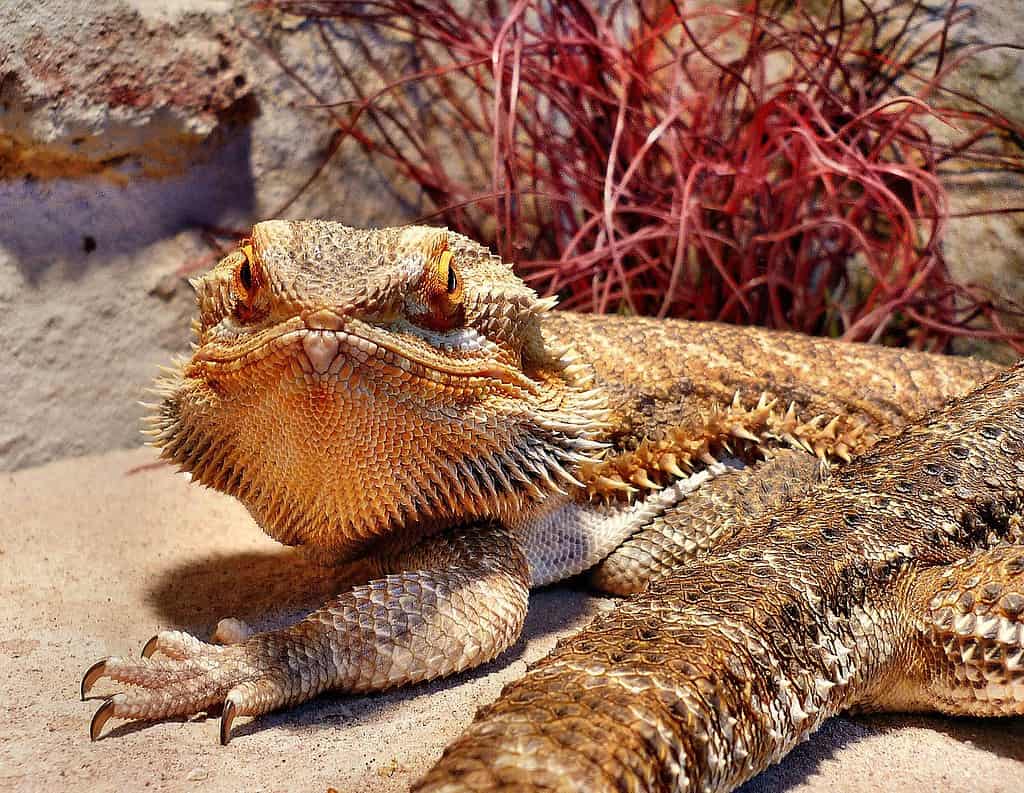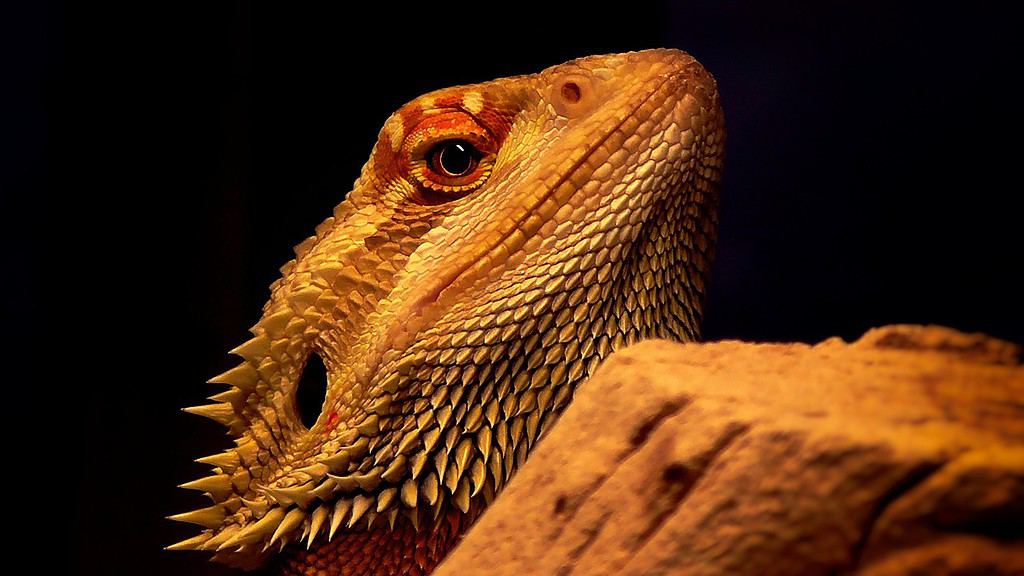Bearded dragon owners are curious about their pet’s colour vision. There are different statements concerning bearded dragons’ colour perception. But are bearded dragons colour-blind?

Bearded dragons aren’t colourblind. In fact, they can see all the colours you can. Bearded dragons may perceive more colours than humans. But they perceive lighter colours better. So they like light-coloured items.
So, the fact that bearded dragons can see colours is pretty impressive. Lizards have more colour receptors than other living things; thus, they can see more.
Bearded Dragon Colour Vision
A typical eye contains three colour receptors that mix and combine to form the colours you see. There are four different colour receptors in the eyes of reptiles like the bearded dragon. Because of this, they could receive light that was not apparent to other people.
Ultraviolet Light
Ultraviolet light, also called UVB, is on a different part of the light spectrum than we can see. This is usually emitted by the sun, the same thing we all utilize to make vitamin D in our bodies.
When placed beneath a UVB bulb, certain birds can reflect this light, which causes the bulb to produce unique colours. In addition, the fact that birds hunt bearded dragons in the wild offers them an edge over the bearded dragons since they can better see them.
Infrared Light
Infrared lights are another kind you can’t see with your own eyes. This light can usually still be found even when there is no visible light.
This doesn’t mean bearded dragons have good night vision. Because bearded dragons are diurnal, meaning they are only active during the day, they have never evolved their capacity to hide.
Can Bearded Dragons Be Colour Blind?
A bearded dragon cannot be colour-blind. A living organism is colour-blind if it can’t see at least three colours with its eyes.
This is based on the number of colour receptors the eye possesses, which is three for a typical eye. Bearded dragons have at least four colour sensors in their eyes. They can see more because of this, and they are also able to see what they see more clearly than other individuals. So, a bearded dragon can’t get colour-blind. They utilize their colour vision since they can see more.
What Colour Can Bearded Dragons See?
Bearded dragons have a great colour vision in both eyes. They are able to see every hue that we humans can see. On the other hand, bearded dragons can’t see straight ahead because their eyes aren’t in the same place as ours. Because of this, they frequently have trouble noticing an item that is approaching them. On the other hand, this had nothing to do with the way that they see colour. Many times, your bearded dragon will be able to see more colours than you can.
Is a Bearded Dragon’s Vision Important?
You can do so much more when you can see a wider range of colours. Assume being able to see things that most people can’t. It would be like having a superpower.
Here are some things that bearded dragons can do because they can see more colours.
Hunting
Bearded dragons are better hunters than others because they can see colour. Because they can detect an additional colour, they can readily locate their prey even when it is hiding in a crowded area because of their ability to sense a different colour.
Even if bugs hide in the tall green grass, they will be easier to see. Even if they were moving around from plant to plant, crickets would be simpler to spot due to their larger size. All of this is possible because they are so sensitive to colour.
Survival
Their enhanced vision helps them hunt and protects them from being hunted. When searching for food, some birds bounce UVB radiation off their feathers. Bearded dragons can spot these birds from kilometres away before they are even close enough to catch them. Bearded dragons can see predators by the colours they reflect.
Bearded dragons need UVB, thus, being capable to see it will help them find it. This is very helpful when a bearded dragon wants to get some heat. Bearded dragons can’t make Vitamin D without UVB, which maintains their skin healthy and controls calcium and phosphorus. This shows how important this ability is to their survival.
The Time of Day
Bearded Dragons may utilize their parietal eye to determine time and dusk. The parietal eye, sometimes known as the “third eye,” is responsible for recognizing when nightfall is approaching. It does this by detecting even minute shifts in the light when the sun sets, and the sky darkens.
Because they are not nocturnal, Bearded Dragons need to have a strong understanding of the day-night cycle of the sun. This is essential for them. In captivity, it’s necessary to turn out the lights simultaneously each night.
Because of this, you should never leave any lights on in your Bearded Dragon’s tank at night. The dragon’s third eye will see the light and assume it’s daytime.
Communication
Animals don’t have a language that everyone can understand as we do. Some of them employ the use of colour as a means of conveying their emotions and messages to one another and other animals.
Bearded dragons are one animal that uses colour to talk to other animals. Even though they cannot change the colour of their complete body, they can change the colour of particular bodily sections.
Their colour vision enables them to differentiate any colour differences amongst bearded dragons, even those that are as slight as a night’s whisper.

Can a Bearded Dragon See at Night?
Beardies have poor night vision. Therefore, be careful when turning off the terrarium lights. For instance, it is always a great idea to install an automated switch that turns the lights down simultaneously every day. This will ensure that you never forget to turn them off. This helps set their biological clocks and tends to help them sleep well. In that case, the bearded dragon can become anxious and believe that the sleeping space is not secure.
How Far Can a Bearded Dragon See?
It is difficult to provide an accurate number of distances a bearded dragon can see. They have excellent vision and can see as far as they need to hunt insects and avoid being eaten by larger animals.
Some owners say their Bearded Dragon spots planes and watch them until they’re out of sight. If you put a worm or another insect on the floor at one end of the room, your Bearded Dragon would easily see it, recognize it, and chase after it from the other end. It is well known that bearded dragons have relatively poor perception when determining the size of things and the distances between them.
Can Bearded Dragons Perceive a Red Light at Night?
Some think bearded dragons can’t see red. So, leave red lights on at night while the beardie sleeps. Despite this, research has demonstrated that bearded dragons can see red light at night.
You are free to do your investigation into this matter if you so want. When you show the bearded dragon a red picture, you will find that the dragon pays special attention to the image. This demonstrates that beardies can distinguish red colours. Therefore, utilizing red lights when the bearded dragon is sleeping will disrupt its natural biological cycle and cause it to awaken more frequently.
